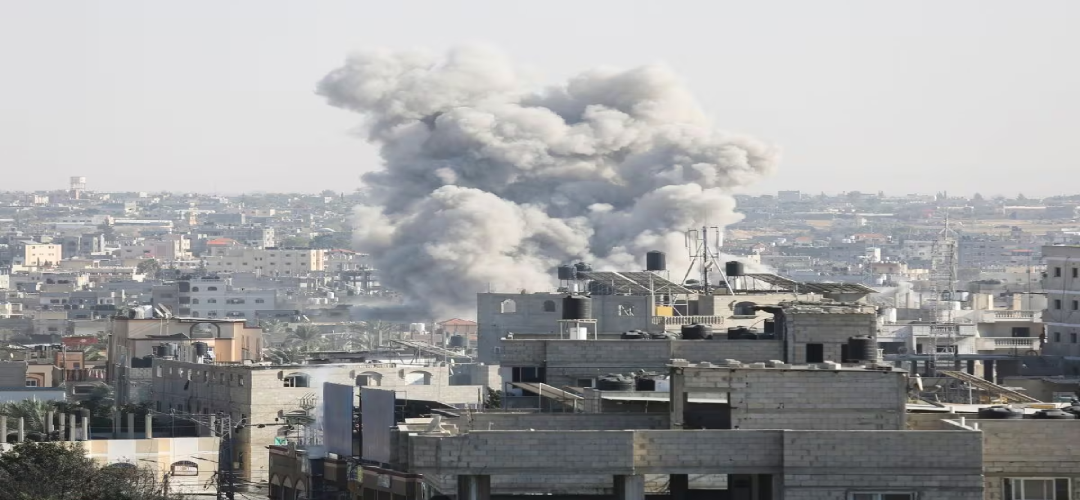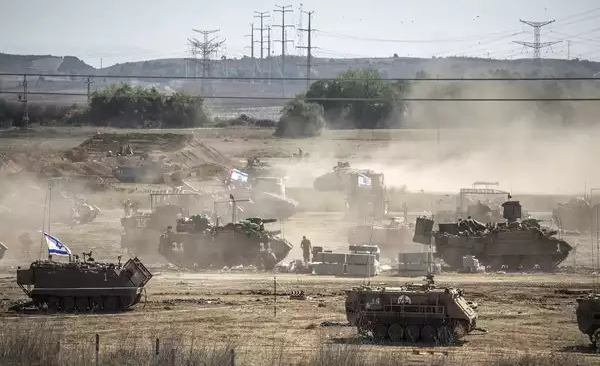A Master Stoke ?
October 29, 2023 | Expert Insights

Who could have imagined just a few weeks ago that the situation in the Middle East would dive South so rapidly and so comprehensively.
Early this month, both Israel and Saudi Arabia had publicly announced resumption of diplomatic relations, at the apex levels, giving hope for revival of peace in the cauldron that is the Middle Eastern geopolitics. Clearly, there are vested interests that did not place much store by allowing Israel the comfort of rapprochement with its Arab neighbours, without the Palestinian issue being a part of that package deal.
Iran, was the biggest elephant in the room as it has vowed the destruction of the Zionist nation and now felt that self-serving Arab interests were subsuming the Palestinian cause. So, the fuse was once again lit in the tinderbox and the explosion was indeed impressive. As hundreds perish daily, now mostly on the Palestinian side of Gaza, the prospects of peace are as remote as human beings seeking residence on Mars.
Background
The history of the Israeli-Palestinian conflict has been the subject of so much literature that it would be futile to repeat it here.
The proposed framework of a two-state solution has been a topic of intense diplomatic efforts spanning several decades. In brief, this aims at resolving the Israeli-Palestinian conflict by establishing distinct states for the Jewish and the Palestinian people.
While the U.S. supports the two-state idea, it argues that border negotiations must occur directly between the parties involved.
The 13 August 2020 joint Statement by the U.S., United Arab Emirates, and Israel, was a defining moment in the evolving regional political architecture in West Asia. Conceptualised as part of the Trump administration's ‘Middle East Peace Plan’, the Abraham Accords have been publicised as the ‘Deal of the Century’. The UAE and Israel would develop ties in numerous areas such as trade and investment, security, tourism, technology, and energy, and establish formal embassies in each other’s countries. Israel would, in turn, suspend its planned annexation of parts of Judea and Samaria (West Bank) and focus instead on expanding relations with other Arab and Muslim countries. The UAE also sought to appeal to other Muslim countries and bring them over in favour of the deal while projecting this as a major ‘diplomatic feat’ in terms of the ‘Palestinian question’. Slowly, but surely, other Arab nations were drawn into this deal with the most prominent being Saudi Arabia.
Hamas has effectively put a spanner into the deal, at least for the foreseeable future.

Analysis
At the time of the deal, Synergia Foundation had assessed those misgivings surrounded the Abraham Accords within the Arab world as also the larger Islamic umma. The deal ran the risk further divide the Muslim world by creating sharply defined blocs within it. While Palestinians and the Hamas were the most vocal in their protest, Iran and Turkey also denounced it. Now, these predictions have sadly been proven correct.
Hamas is a factor that cannot be entirely ignored, unlike the moribund Palestinian Authority living off the grants by Gulf and EU countries in the West Bank. Hamas has been in control of the Gaza Strip since 2007 when it ousted the P.A. in a violent coup. Hamas has been accused of human rights abuses, including the suppression of political dissent, the use of torture, extrajudicial killings and using its civilians as human shields. Hamas has been involved in numerous conflicts with Israel, including the 2021 Hamas has over the years developed a formidable fighting capacity ideally suited to its densely packed urban landscape by siphoning off millions of aid money from Qatar and the EU and with an active collusion with Iran and the Hizbollah. But, for whatever reason, Israeli intelligence failed to see the frustration and the desire to disrupt the peace process that motivated Hamas to perpetrate the October 7th massacre and trigger the ensuring bloodbath in Gaza.
While the Arabs and the Muslim world struggle to unite, this war is increasingly taking on the shape of Muslims against the others. In a single stroke, the world has been divided into two distinct camps, which by itself is a major tragedy.
With the U.N. Security Council locked into a log jam, the U.S. is ready to veto any resolution blaming Israel or imposing a ceasefire before the release of hostages. The Arab and Muslim countries have tried to gain traction by holding a series of international conferences.
The most important external actors to look at are Iran and the USA.
Iran funds Hamas and arms their terror activities. Surprisingly, in the early stages of the conflict, both the U.S. and Israel claimed that Iran did not sanction the October rocket salvos. The situation has changed dramatically since then, with Iran providing the major thrust in generating pressure on Israel through direct action rather than relying entirely on diplomacy. It has openly declared that if the long-awaited Israel ground offensive into Gaza is launched (allegedly put on hold by U.S. pressure), Hamas would receive active support from its supporters all along the periphery of Israel. Of course, by this, it means its proxy, the well-armed Hezbollah.
The main concern for the USA (and the rest of the world) is the escalation of the conflict in the region, not least limited to the northern Lebanese border. The worst-case scenario would be an American-Israeli unilateral military action against strategic targets deep inside Iran if Israel is threatened by multidirectional attacks by Iranian proxies from Yemen, Syria and Lebanon simultaneously. The U.S. Secretary of Defence, Lloyd Austin, has made this unambiguously clear. For the U.S., the most frustrating development is that, for the first time in decades, its closest Middle East ally (after Israel), the Kingdom of Saudi Arabia, is on the same page as Teheran! In fact, the attack sounded the death knell of the Abrahams Accord and its sequels, at least for the foreseeable future at least.
October 7th has come as a God-sent opportunity for Russia and China; Ukraine has vanished from world view and, preoccupied with the powder keg that the Middle East has turned overnight, the flow of military aid to Ukraine is bound to be impacted (despite the $ 100 billion sought from the U.S. Congress). China, too, is sharpening its knives, finding its arch-rival pushed into a corner in defence of Israel.
Indian diplomacy with respect to its Middle East policy faces its toughest test yet. Key considerations to India's engagement in the region span security and economics. Alignment with the U.S.A on security considerations is important due to a common out in combating terrorism and Asian interests contra China. Moreover, increasing defence cooperation with Israel underlines this goal. Economic priorities are the hallmark of India’s engagement with the Middle East - and the foreign policy needs to balance its goal towards maintaining growing relationships with all involved actors - most notably the U.S., Israel, UAE, and Saudi Arabia. India had taken pride in being party to agreements like I2U2 (India-Israel-UAE-US), which now appear only dream-like.
Assessment
- India has faced a major setback to its Middle East geoeconomic strategy. The post-G20 push towards realising the IMEC has inspired Indian activity. The key challenge for IMEC's success was the land route between UAE, Saudi Arabia, Jordan, and Israel. This relied on a normalisation between Saudi Arabia and Israel. However, the war in Gaza has pushed back any such considerations for at least a couple of years.
- The Palestinian issue is a Gordian Knot that has long eluded a solution. The current war has made it even more intractable. The tragedy is that a lot is being spoken of the two million Palestinian people caught in the crossfire, but for both principal protagonists-Hamas and Israel- they are mere pawns. Only a forceful intervention on purely humanitarian grounds by the international community can bring an early stop to the killings.
- What after the fighting stops? For one, the two-state solution is again up in the front, something that Israel was keen to put on a back burner. On their part, the Arab states need to assure Israel of its security and existence to draw any concessions from Tel Aviv if any worthwhile progress is to be made towards a universally acceptable solution.








Comments